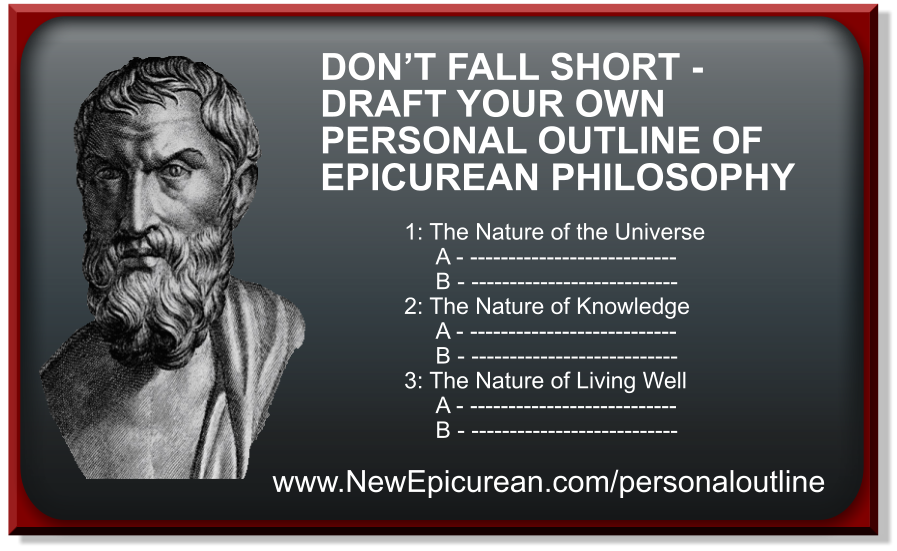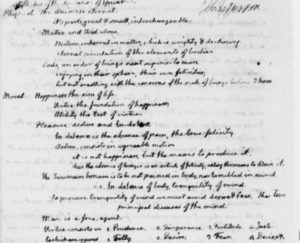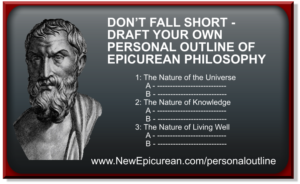Draft Your Own Personal Outline of Epicurean Philosophy
(To go straight to the EpicureanFriends.com forum to work on your outline, click here.)
Outlines are important in learning Epicurean philosophy. Epicurus advised in the letter to Herodotus that everyone should be able to reduce the major principles of the philosophy to a simplified outline of the main points. Epicurus wrote:
“Those who have made some advance in the survey of the entire system ought to fix in their minds under the principal headings an elementary outline of the whole treatment of the subject. For a comprehensive view is often required, the details but seldom. To the former, then—the main heads—we must continually return, and must memorize them so far as to get a valid conception of the facts, as well as the means of discovering all the details exactly when once the general outlines are rightly understood and remembered. It is the privilege of the mature student to make a ready use of his conceptions by referring every one of them to elementary facts and simple terms. For it is impossible to gather up the results of continuous diligent study of the entirety of things unless we can embrace in short formulas and hold in mind all that might have been accurately expressed even to the minutest detail.”
We know that Thomas Jefferson followed this advice because we have the outline he himself included in his letter to William short in 1819. Here it is in Jefferson’s own handwriting (click here for full text):
Outlines, however, must be applied to particular circumstances in order to be useful. We have an interesting example of this in Jefferson’s letter to William Short. Jefferson provided to Short his summary of Epicurean philosophy in general principles, but Jefferson also pointed a particular error that Short was committing: Even though Short considered himself to be an Epicurean, Short was misinterpreting the philosophy by thinking that Epicurus advised rest and repose as the goal of living. Jefferson corrected this error – an error still widely committed and spread by commentators today – by advising action to pursue pleasure, rather than repose:
“I take the liberty of observing that you are not a true disciple of our master Epicurus, in indulging the indolence to which you say you are yielding. One of his canons, you know, was that “that indulgence which prevents a greater pleasure, or produces a greater pain, is to be avoided.” Your love of repose will lead, in its progress, to a suspension of healthy exercise, a relaxation of mind, an indifference to everything around you, and finally to a debility of body, and hebetude of mind, the farthest of all things from the happiness which the well-regulated indulgences of Epicurus ensure; fortitude, you know is one of his four cardinal virtues. That teaches us to meet and surmount difficulties; not to fly from them, like cowards; and to fly, too, in vain, for they will meet and arrest us at every turn of our road. Weigh this matter well; brace yourself up.”
Notice how Jefferson in the same letter described “in-dolence” as “the greatest felicity,” while at the same time rebuking Short for pursuing indolence! This is an example of how Epicurean terminology cannot be considered superficially, and must be considered closely if it is to be applied correctly.
We each therefore need to learn to understand Epicurus thoroughly so that we do not misapply his advice. As an aid in following this path, a special forum group has been set up at EpicureanFriends.com, where you are invited to post your own personal outline as you study Epicurus. As you post, you can then receive comments and suggestions from others that will give you ideas and advice about how you can improve your personal outline.
Although Epicurean philosophy has general principles that apply to everyone, Epicurus also emphasized the reality of the individual context in which we must apply the general principles. The best way for anyone to begin to apply Epicurean principles is to follow Epicurus’ own advice: produce your own outline that states clearly and succinctly the principles that you are applying toward living happily. While most people will end up categories that are similar, each person has their own context of concerns and spheres of action in which to consider how to pursue pleasure and avoid pain. The details of each individual outline will therefore vary according to those circumstances.
Here is an example of the variety you can expect:
Some people are already sufficiently confirmed in their own understanding of the nature of the universe that it is appropriate for them to stop (at least at first) with a broad conclusion, such as:
“Nature: The universe operates on Natural principles, and is not influenced by supernatural forces.”
Others, however, will want to outline the study of the universe (physics) in much more detail so that they can understand, and hold with confidence, the reasons why this conclusion (the universe operates on natural / non-supernatural principles) is true.
Most, in all likelihood, are somewhere in between, and they need to outline the fundamentals of how nothing exists except matter and void, that nothing is ever created from or destroyed to nothing, and similar observations that underlay the fundamental conclusion that the universe is natural.
In sum, please drop over to EpicureanFriends.com at the link below and open a thread with your own draft of a personal outline. Then others who are familiar with Epicurean philosophy can make helpful comments and suggestions to assist you in refining your refine your outline so that it is most beneficial to you.
The final passage in Epicurus’ Letter to Menoeceus advises us to study the doctrines of true philosophy along with like-minded friends. You may not have the advantage of local Epicurean friends with whom to do this, but in this online version of an Epicurean Garden, we can together carry out his advice.
Here are a few suggestions for posting your first outline:
- Keep it simple. Don’t try to cover every aspect of your life or thoughts about Epicurean philosophy in the first outline. Make sure to cover the main points first.
-
Although you want to keep the outline simple, you also want to cover the three major branches of Epicurean philosophy: (1) The nature of the universe, (2) The nature of knowledge, and (3) The nature of how to live.
3. Don’t delete your first outline post, but copy it over into new posts and make the changes there. That way you can follow the progression of your thoughts as you refine your understanding.
The best thing to do is go ahead and post your outline even if you think it is incomplete. A major benefit of this exercise is thinking through the process, and others can make suggestions for additions or changes as you go through the drafting process. Also remember that there is no ultimate outline for everyone, and you will no doubt find yourself redrafting over and over as you apply the general rules to your particular situation.
Remember: copying someone else’s outline and adopting it as yours does nothing to advance your understanding of Epicurean philosophy or how it should be applied in your life. You may think that someone else has already developed the ultimate Epicurean outline, and think that it is sufficient to adopt it for yourself. Nothing is further from the truth. Unless you can state the principles yourself, understanding why each of them is true and important, you advance no further in your own understanding of applying Epicurean philosophy to your life.
Here’s a good example of the pitfall of copying without understanding:
One of the most well-known outlines of Epicurean philosophy is the “Tetrapharmakon”: (1) Don’t fear God, (2) Don’t fear death, (3) What’s good is easy to get, and (4) What’s bad is easy to avoid.
This is a very easy to remember and concise statement of certain aspects of the first four principal doctrines. However if you do not understand the reasoning behind it, you can easily become discouraged, dismayed, and completely turned off from Epicurean philosophy. Many people reading the Tetrapharmakon immediately think to themselves: “Why shouldn’t I fear god? Why shouldn’t I fear death? I don’t find that what is good is easy to get and I certainly don’t find that what is bad is easy to avoid!” These people dismiss Epicurus as just another ivory-tower academic, and they miss his true insights completely.
Only someone who is familiar enough with Epicurean philosophy to understand the reasoning behind the Tetrapharmakon can use it appropriately. It takes study to understand Epicurus’ reasoning that gods are not to be feared because such “divinity” as may exist is perfect and does not interfere with mortals. It takes study to understand Epicurus’ reasoning that death is not to be feared because there is no consciousness after death. It takes study to understand the reasoning behind “the good” being easy to get, “the bad” being easy to involved” and why the issue of “limits” is relevant to the question at all.
Absent study into the reasoning of Epicurus, a too-brief summary can seem trite and off-putting. It is therefore necessary for each student to build up – step by step – their own understanding of Epicurean philosophy. Only then can they construct in their own context an appropriate outline that reflects their own understanding and assists them in applying Epicurean principles to their own lives.
This is a new project and we will be working out many kinks as we go along. However the process of working together with other student of Epicurean philosophy to produce an outline most suitable for yourself should be a beneficial process to everyone involved. Get get started as soon as you can at www. Epicurean friends.com
TO GET STARTED: When you get to EpicureanFriends.com, you will see a list of forums at the top of this page (Epicureanfriends.com / Forum / General Discussion & News / Personal Outlines of Epicurean Philosophy). Click on Personal Outlines of Epicurean Philosophy and select CREATE THREAD. Then just start typing your outline and any descriptions / explanations / or requests for suggestions!



